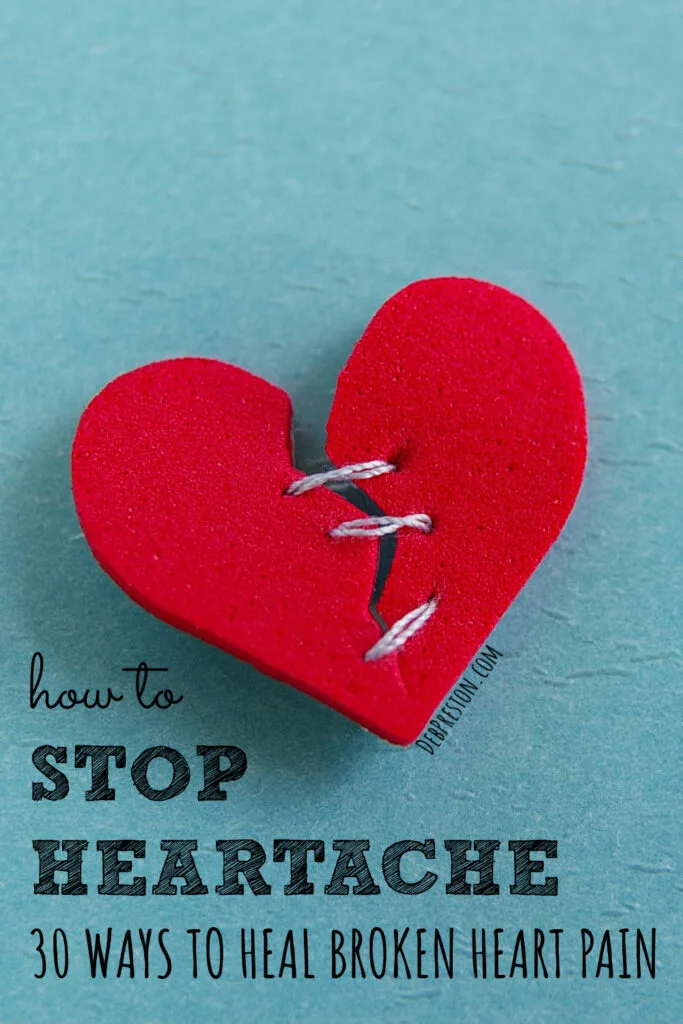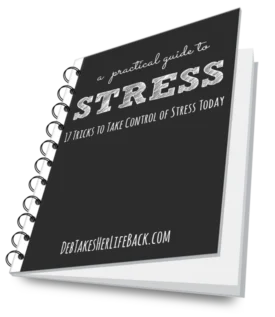I’ve desperately wondered how to stop heartache several times in my life. From the loss of a relationship, to the loss of a loved one, to the loss of a future I had assumed was mine forever, each heartache brought with it grief, depression, anxiety, anger, and even physical pain.
Heartache is almost always an overwhelming, life-consuming experience. And it can make you feel as if you’ll never truly recover from it.
But while there might always be a part of you affected by your heartache, there are actually a whole host of ways you can help to ease your pain and speed up the healing process. The first step is to understand what heartache really is.
Understanding Heartache
When you experience heartache, it’s often due to a deep emotional pain tied to love or loss. This section will guide you through what heartache is, its symptoms, and the science behind this emotional experience.
Defining Heartache
Heartache is a term that encapsulates the complex emotional distress you may feel after a significant relationship ends or when you suffer a profound loss.
It’s not just about feeling sad. Heartache can involve intense emotional pain that feels as real and overwhelming as physical pain.
Common Symptoms of Heartache
Symptoms of heartache can vary greatly from person to person but often include:
- Emotional: depression, grief, a sense of emptiness
- Physical: chest pain, stomach pain, loss of appetite
- Behavioral: crying, irritability
- Psychological: anxiety, stress, difficulty concentrating
The Science of Heartache and Emotional Pain
Heartache is more than just an emotional state; it has a tangible effect on the human body. Stress hormones like cortisol are released during emotional upheavals, which can cause physical symptoms like headaches or fatigue.
Studies suggest that areas of the brain that process emotional pain overlap with those that deal with physical pain, which is why your heartache can genuinely hurt physically. Additionally, intense emotions like anger, fear, and anxiety can exacerbate these sensations, intensifying the experience of heartache.
Physical Aspects of Heartache
The physical manifestations of heartache are real and can feel intense, often mimicking symptoms of other conditions such as heart attacks. It’s crucial to recognize these symptoms and understand when they may require medical attention.
Recognizing Physical Symptoms
Heartache can manifest physically in ways that may surprise you. Symptoms often include:
- Chest pain or discomfort
- Shortness of breath
- Physical pain that be vague or localized
- A feeling of tightness or pressure in the chest
- Dizziness or lightheadedness
- Nausea and sometimes vomiting
- Experiencing a cold sweat
- Unexplained fatigue
These symptoms demonstrate how closely linked our emotions are to our physical well-being.
Heartache vs. Heart Attack
While heartache can often feel like a heart attack, there are a few key differences:
- Pain from a heart attack often comes on suddenly and is more intense.
- Heart attack pain usually radiates to other parts of the body, such as arms or jaw.
- You might feel an overwhelming sense of doom with a heart attack.
- Cold sweat, along with nausea or vomiting, is more common during a heart attack.
- Heart attacks are typically associated with high blood pressure and a decrease in blood flow.
When to Seek Medical Attention
You should seek emergency medical attention if:
- Chest pain persists or worsens, especially if it’s unlike anything you’ve felt before.
- You’re experiencing heavy sweating, nausea, vomiting, or dizziness alongside chest pains.
- Shortness of breath doesn’t improve and is coupled with other symptoms like fatigue or lightheadedness.
- Your pain spreads to the arm, back, neck, jaw, or stomach.
- If your intuition says something is seriously wrong—trust it and call 911.
Understanding the physical aspects of heartache can empower you to take appropriate action, whether that means giving yourself time to heal emotionally or seeking urgent medical care in the face of a potential heart attack. Remember, your health and safety are key.

Emotional Processing
When coping with heartache, it’s crucial to not only acknowledge your emotions but also work to actively process them. This is the best thing you can do to pave the way to healing and growth after a relationship breakdown.
The Role of Grieving Process
The grieving process is a natural, yet painful, part of dealing with heartache.
Allow yourself to experience the grief, anger, and fear that may arise from loss, whether it’s from a divorce, breakup, or another form of relationship ending. It’s a stepping stone toward recovery that invites you to remember the good times, face each emotion intimately, and eventually, release the pain.
Practice Acceptance
In the journey of healing, acceptance plays a pivotal role. Embrace the reality of the situation and your resulting feelings.
Acknowledging that a relationship has ended, and that stress and anxiety are normal reactions, helps in moving forward. Acceptance is not about approval; it’s about recognizing what is, to lessen internal conflict.
Developing a Support System
Creating a strong support system is essential in managing heartache. This can include friends, family, or even a therapist who can provide perspective and guidance during tough times.
Remember, seeking out therapy doesn’t signify weakness; it’s a proactive step in the healing process. Lean on your support system to help combat loneliness and disperse the weight of emotional burdens.
How to Stop Heartache: Lifestyle Adjustments
Making positive changes in your lifestyle plays a pivotal role in mending heartache. Embracing self-care, nurturing your body through exercise and diet, practicing mindfulness, and expressing emotions can foster healing and strengthen your mental and emotional health.
Self-Care Strategies
The best thing you can do to alleviate emotional pain is to take care of yourself.
This means getting ample sleep, managing stress, and reducing harmful habits like smoking or excessive alcohol consumption. Ensure you stay hydrated by drinking plenty of water, and make time for activities that bring you joy.
Regular Exercise and Diet
Incorporating regular exercise into your routine can significantly impact your overall well-being and is known to be beneficial for both physical and mental health. Aim for a mix of cardiovascular, strength, and flexibility workouts.
Complement this with a healthy diet rich in vegetables and fruits, and low in processed foods to help optimize both your physical health and mental clarity.
Mindfulness and Meditation
Practicing mindfulness and meditation can be powerful acts in managing stress and emotional distress.
Spend a few minutes each day in meditation to clear your mind and center your thoughts. This practice can lead to improved emotional regulation and a more resilient heart.
Journaling and Emotional Expression
Writing down your thoughts and feelings in a journal can help process emotional pain. Whether it’s daily reflections or expressive writing, getting your emotions onto paper is therapeutic and helps in understanding and articulating what you’re going through.
Approach Social Media with Caution
Some people will disagree with me on this one; they’ll say that social media helps them to feel connected to their family and friends. But I’ve personally found the best thing I can do for my mental health during a heartache experience is to take a pause from social media.
Sure, social media can help you to feel more connected to others. But I’ve found that online connections are not only less effective than in-person connections, but can actually make you more self-aware of your lack of in-person interactions, causing you to feel even more lonely.
Plus, social media is incredibly good at reminding you of what you’ve lost when you scroll past the highlight reels from everyone else’s lives – happy couples, unbroken families, close-knit social circles, and more. Make your own call on social media, but be honest with yourself about how it affects your mental health.

Navigating Relationships and Breakups
Relationships can be rewarding but also challenging, and breakups, though difficult, are sometimes a part of life. Understanding how to heal, engage in new relationships confidently, and rely on friends and family for support can help you navigate these personal dynamics.
Healing After a Breakup
After the end of a relationship, it’s normal to feel a mix of emotions, from sadness to anger. To manage these feelings and begin the grieving process, it’s essential to:
- Give yourself permission to feel: Recognize that it’s okay to have feelings of loss and sadness.
- Stay active: Engage in activities such as exercise, which can help reduce stress and high blood pressure.
- Lean on your support system: Friends and family can provide comfort and a listening ear.
- Practice acceptance: Accepting the situation is a crucial step towards healing.
Dating and New Relationships
When you’re ready to explore a new relationship:
- Take it slow: Allow yourself to gradually understand your needs and expectations.
- Communicate openly: Be honest with your feelings to build trust in a new relationship.
- Reflect on the past: Use lessons from previous relationships to inform your dating life.
Family and Social Relationships
The role of family and your broader social circle is crucial during times of emotional upheaval:
- Find solace in family bonds: Healthy relationships are incredibly good things that can provide a sense of stability and belonging.
- Broaden your social network: Engage in group activities or hobbies to meet new people and strengthen your support system.
- Manage emotions constructively: Share your experiences with others to mitigate feelings of stress, anger, or heartache.
Navigating the complexity of relationships and breakups takes patience and self-compassion. By focusing on healing, allowing new relationships to grow, and harnessing the support of family and friends, you can move forward with confidence and resilience.
How to Get Over a Broken Heart When You Still Love Him
True, true, this question could easiy get lumped into the relationships section above. But I think this is a very distinct issue to which the majority of us can relate.
Getting over a broken heart when you still have feelings for someone can be particularly challenging. Here are some steps you can take to help you move forward:
Accept Your Feelings
Recognize that it’s normal to still have love for someone even after the relationship has ended. Allow yourself to feel your emotions without judgment; feeling the pain is an essential part of the healing process.
Implement No Contact
Consider a period of no contact with the person, which includes not seeing them, calling, texting, or checking their social media profiles. This can help create the space necessary for healing.
Distancing yourself can often be the best way to move on.
Seek Support
Lean on friends, family, or a therapist for support.
They can offer a listening ear, advice, and comfort during this tough time. It’s important to have a support system to help you through the emotional ups and downs.
Pursue Interests and Hobbies
Engaging in activities you enjoy or trying out new hobbies can help distract you from your heartache and bring you joy and fulfillment in other areas of your life.
Practice Self-Care
Take care of your physical and mental health.
Exercise, eat well, get plenty of sleep, and do things that make you feel good about yourself. The importance of self-love and self-care during this time cannot be overstated.
Create New Memories
Start new traditions or go to new places that don’t have memories attached to your past relationship. This can help you look forward to new experiences and good things rather than dwelling on the past.
Reflect on What You’ve Learned
Use this time to reflect on the relationship and what it has taught you. This can help you grow and potentially avoid similar issues in future relationships.
Consider Professional Help
If you find it too difficult to handle the heartbreak on your own, consider seeking help from a professional counselor or therapist who can guide you through your emotions and coping strategies.
Remember, healing from a broken heart takes time, and it’s okay to move at your own pace. In fact, giving yourself the time and space you need, rather than implementing an arbitrary deadline, is the best way to ensure you’re truly healing.
Is there any good news about heartache?
Despite the immediate pain it can cause, there is some good news about heartache:
- Personal Growth: Heartache often serves as a catalyst for personal growth. It can prompt introspection and self-discovery, helping individuals understand their needs and desires more deeply.
- Increased Resilience: Going through the pain of a broken heart can build resilience. Overcoming the challenges of heartache can make you stronger and better equipped to handle future setbacks.
- Greater Empathy: Experiencing heartbreak can increase your capacity for empathy. Understanding your own pain can make you more compassionate and understanding toward others who are going through similar experiences.
- New Beginnings: A broken heart can signify the end of one chapter and the beginning of another. It can open the door to a new relationship, experience, or opportunity that you might not have pursued otherwise.
- Improved Health: Some sources suggest that the stress and pain of heartache can ultimately lead to better health choices, as individuals may be more motivated to take care of themselves and make positive life changes.
- Deeper Connections: After experiencing heartache, you may develop deeper and more meaningful connections with others. Having been through hardship can make your relationships with friends and family more profound as you value their support through tough times.
- Spiritual Growth: For some, heartache can lead to spiritual growth or a renewed sense of faith as they seek comfort and understanding.
While heartache is undeniably difficult, these potential silver linings can provide some comfort and hope during the healing process.

It’s certainly not easy, learning how to stop heartache. But by working your way slowly through these steps, you’ll find that you begin to heal, even if just a little each day.
You are strong. You are capable. And you are worthy of healing and happiness.
You’ve got this, friend!
Frequently Asked Questions About How to Stop Heartache
In this section, you’ll find targeted advice to navigate the emotional journey of heartbreak, with practical strategies for self-support and ways to help friends in need.
What are effective coping mechanisms for heartbreak?
Engaging in self-care and allowing yourself the time to grieve can serve as fundamental coping strategies. Equally important is reaching out to support networks like friends and family for companionship and comfort.
What is the best way to support a friend dealing with a broken heart?
Being present and listening to your friend’s feelings without judgment is essential. Encourage them to engage in activities that make them feel better and remind them that it’s okay to seek help if they need it.
How can men best manage the pain of heartbreak?
Men can benefit from many of the same strategies that help anyone dealing with heartache: acknowledging feelings, pursuing hobbies and interests, and staying connected with others. It’s important for men to know that expressing emotion is healthy and can aid the healing process.
How can I heal my heartbreak from losing a best friend?
Healing from the heartbreak of losing a best friend is a process that can take time, and it involves several steps that can help you cope and move forward. Here are some strategies that might help:
- Allow Yourself to Grieve: It’s important to acknowledge your feelings and give yourself permission to go through the grieving process. Whether your friend passed away or you’ve experienced a friendship breakup, it’s normal to feel a range of emotions such as sadness, anger, or confusion.
- Seek Support: Reach out to other friends, family members, or a support group where you can share your feelings and experiences. Talking about your loss can be therapeutic and help you feel less isolated.
- Practice Self-Care: Engage in activities that promote your well-being, such as exercise, hobbies, or relaxation techniques. Taking care of your physical and emotional health can improve your mood and energy levels during this difficult time.
- Create a Ritual or Memorial: Honoring your friendship through a personal ritual or memorial can provide a sense of closure and serve as a way to cherish the good times and memories.
- Reflect on the Experience: Consider journaling or speaking with a therapist to process the friendship’s end. Understanding what happened can provide insights and help you grow from the experience.
- Give it Time: Healing from a loss doesn’t happen overnight. Be patient with yourself and understand that it’s okay to have good days and bad days.
- Focus on Other Relationships: Investing time and energy into other relationships can also help fill the void left by the loss of a best friend.
Remember, there’s no right or wrong way to heal from the loss of a best friend.
It’s a personal journey, and what works for one person may not work for another. If you find that you’re struggling to cope, it may be helpful to seek professional help from a counselor or therapist.
Is there a typical duration for heartache, and how can one speed up the healing process?
Heartache can last for different spans of time for different individuals—there’s no set duration. However, actively working on self-growth and seeking professional guidance when needed can foster healing.
Why does the experience of heartbreak cause such intense emotional pain?
Heartbreak is often likened to withdrawal from an addiction; your brain has to adjust to a significant change in your life. The intensity of pain is due to the deep emotional attachment and the disruption of plans and dreams that your relationship represented.
Can the emotional pain from a loss ever fully heal, and how can one help it along?
While the scars from a loss might always be a part of your history, the pain does lessen over time as you form new memories and experiences. Seeking counseling, practicing mindfulness, and allowing yourself to grieve are all positive steps toward healing.

P.S. Could you use a little extra help with your stress levels? Download A Practical Guide to Stress | 17 Tricks to Take Control of Stress Today to help you develop a game-changing stress management plan. It’s free! Get yours HERE.
Disclosure: While all opinions are our own, we are a participant in the Amazon Services LLC Associates Program and other affiliate advertising programs, designed to provide a means for us to earn fees by linking to Amazon.com and affiliated sites, at no additional cost to you.



